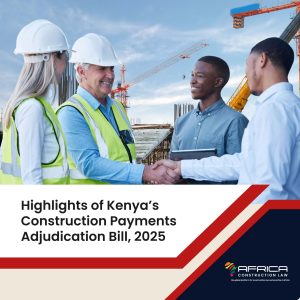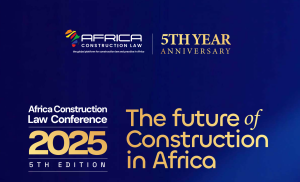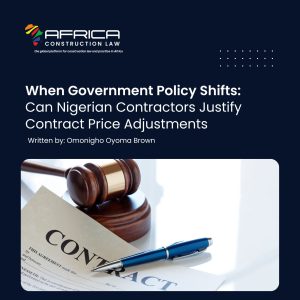Critique on the Process of Appointment of a Disputes Adjudication Board under Clause 20 of the FIDIC 1999 Contracts
By: Nikhil Desai and Kylie Ochuodho of Desai & Co. (Nairobi)
FIDIC Contracts; Sub clause 20.2; Dispute Adjudication Board; Construction disputes; Kenya
This article discusses the loophole that exists under Clause 20 of the International Federation of Consulting Engineers Contract (Fédération Internationale des Ingénieurs-Conseils) (FIDIC)1999 Contracts, and the practical problems that may arise as a result of resolving disputes, from the point of view of both Parties to a FIDIC contract. We take note of the fact that the FIDIC Books were revised in 2017. Nonetheless, this article will center on the 1999 rules as most of the current disputes continue to arise under the 1999 contracts as a result of the long-term nature of construction projects.
Out of all the clauses under the 1999 FIDIC Contracts, sub-clause 20.2 has, by far, attracted the most controversy. That in itself is unsurprising, in that if disputes do arise, they can quite quickly become very costly for both the Employer and the Contractor due to the tiered nature of the FIDIC dispute resolution process. One of the potential hurdles that need to be overcome is the Dispute Adjudication Board (DAB) appointment.
The first point of reference for a party seeking to institute a DAB is found under Sub-clause 20.2 which states that “The parties shall jointly appoint a DAB by the date 28 days after a party gives notice to the other party of its intention to refer the dispute to a DAB”.
In the event that parties fail to agree on the appointment of the DAB, the next step would be to turn to sub-clause 20.3, which provides that if the parties fail to agree upon the appointment of a sole member [20.3 (a)] or third member [20.3 (c)] or either party fails to nominate a member [20.3 (b)], “then the appointing entity or official named in the” Contract shall, “upon the request of either or both parties appoint the member to the DAB.”
We have been involved in a matter concerning the Silver Book Contract, where the Employer refused to appoint a representative to the DAB or to even comment on the appointment of the Contractor’s representative to the DAB. Thereafter, the Contractor approached the Appointing Entity but received no response from them either. In such a situation, which is becoming increasingly frequent, what options does a party have to resolve its dispute?
Possible Solutions?
Recent English case law suggests that a DAB can be considered validly constituted even where Parties did not sign a DAA or take part in the DAB appointment process.
In ICC Case 15956, the claim involved a Red Book contract where the parties failed to agree on the establishment of a permanent DAB within 42 days of the commencement date, as provided in the Contract. On the Contractor’s initiative, an ad hoc DAB was established and rendered decisions without the Employer’s consent. Unsurprisingly, the Employer proceeded to refer the DAB’s award to arbitration, arguing that the decisions of the DAB were invalid as the DAB lacked jurisdiction because the employer did not sign the DAA. The arbitral tribunal recognized that sub-clause 20.2 had been poorly drafted and that literal interpretation of sub-clause 20.2 would result in inconsistencies. The tribunal, therefore, opted to look at the parties’ common intention instead of applying a literal interpretation to the wording. In this case, it was evident from the correspondence between the Employer and the Contractor, that both parties intended for a DAB to be set up. The Employer’s opposition to the constitution of a DAB was only raised 4 months after the DAB had already been constituted. Therefore, the tribunal held that the decisions of the DAB were valid as it was the common intention of the parties for a DAB to be constituted. This case seems to suggest that if it can be shown that Parties have the intention to create a DAB, a recalcitrant party cannot use the execution of a DAA as a reason not to have a matter resolved by a DAB. However, it should be borne in mind, that often times a DAB may not agree to resolve a matter without a DAA in place, and if it does, there will most likely be jurisdictional objections raised by the opposing party.
In addition to the above, there has been quite a lot of commentary on whether sub-clause 20.8 of FIDIC contracts, provides a direct route to arbitration without the seemingly mandatory DAB process.
Sub-clause 20.8 provides that: “If a dispute arises between the parties … and there is no DAB in place, whether by reason of the expiry of the DAB’s appointment or otherwise … the dispute may be referred directly to arbitration”.
A literal interpretation of the words “or otherwise” in sub-clause 20.8 suggests that they may be circumstances where a matter may be directly referred to arbitration even where there is no DAB “in place”. This issue has been considered precisely in the International Chamber of Commerce (ICC), the English and the Swiss national courts.
In the English case of Peterborough City Council v Enterprise Managed Services Limited (2014), the parties modified their contract by substituting arbitration with litigation under sub-clause 20.6. The Employer bypassed the DAB process and commenced litigation directly. The Contractor then applied for a stay of proceedings, arguing that referral to a DAB was a mandatory pre-condition to arbitration. The Employer rejected this argument stating that the use of “or otherwise” in sub-clause 20.8 allowed them to opt out of the DAB process. The Employer on their part argued that there was a gap in clause 20 which could potentially leave the unsuccessful party without a remedy. However, the court disagreed and considered that sub-clause 20.8 “probably” applied in cases where the contract provided for a “standing DAB” and held that “gap” would not apply in this case because the parties had opted out of an arbitration clause and instead opted for a litigation clause. In this scenario, because the Parties had opted for litigation as the final dispute resolution, the Court had the power to order specific performance and indeed utilized their power to direct the Parties to the DAB process under the contract.
The English Court in the Peterborough case failed to consider the effect of the use of the word “or otherwise” where the final dispute determination was arbitration, where the powers to order rectification and specific performance may be limited. In the author’s opinion, the English court’s determination seems only to fit the circumstances of the Peterborough case and where the Courts are the final mode of dispute resolution.
Conversely in the Swiss Federal Supreme Court case dated 7 July 2014 (4A_124/2014), we see the court reaching a different conclusion based on similar facts. In this case, the Employer was uncooperative in its participation in the DAB procedure which led the Contractor to refer the dispute directly to ICC arbitration according to clause 20,8. The Employer then challenged the tribunal’s jurisdiction on the basis that the arbitral tribunal lacked jurisdiction because a DAB had not been validly constituted before the Contractor invoked arbitration. The arbitral tribunal rejected this argument and upheld their jurisdiction, arguing that the wording of the contract in clause 20.4 that “either party may refer the dispute in writing to the DAB” insinuated that the DAB procedure is not mandatory. On appeal to the Swiss Court, the court disagreed with the tribunal’s reasoning and found that the DAB process was a mandatory precondition to arbitration. However, the court also held that because the Employer had caused substantial delays and acted in bad faith, they could not insist on DAB being a pre-condition to commencing arbitration. The court relied on the sub-clause 20.8 exceptions stating that the use of “or otherwise” was wide enough to deal with other causes of the expiry of the DAB’s function, such as a party’s refusal to cooperate. The Court held that the Employer had caused substantial delays to the DAB process which was contrary to the principles of good faith, and should therefore not be allowed to insist on DAB being a pre-condition to commencing arbitration.
Conclusion
All the above cases confirmed that a DAB was, in principle, a prerequisite to commencing arbitration or litigation. The final two court decisions were only reversed in respect of sub-clause 20.8 in the case of a “standing” or “ad hoc” DAB. The potential for a direct route to arbitration under sub-clause 20.8 can be utilized to give effect to the intention of the parties to a FIDIC contract and to ensure that the dispute resolution process under FIDIC contracts is not frustrated by a recalcitrant party and the intention of the parties are upheld. Indeed, there is also a valid argument for a direct route to arbitration based on a party’s duty to mitigate loss in certain circumstances.
To mitigate the possible negative effects caused by the gaps in sub-clause 20.2, of the 1999 Rules, Parties may consider:
- Adopting the FIDIC 2017 Rules which replace the sub-clause 20.2 DAB with a standing Dispute Avoidance Adjudication Board (DAAB), that is appointed at the outset of the contract for the duration of the project for all the books (clause 21.1). Appointing a standing DAAB at the onset before any dispute arises is more beneficial than appointing an ad hoc DAB. This is because parties are more likely to be collaborative towards the process at the onset of the proceedings as opposed to when a dispute arises.
- For Parties operating under the 1999 Rules, where the opposing party is being uncooperative in the DAB process, our recommendations are:
- Follow the timelines in clause 20, in good faith, and document any recalcitrant actions or dilatory tactics by the opposing party. Make every effort with the opposing party to have “in place” a DAB.
- Liaise with the Appointing Authority to try and constitute a DAB.
- If (i) and (ii) above, are not successful, approach local courts/arbitral tribunal to obtain orders of specific performance to constitute a DAB.
- As a final resort, utilize the potential direct route to arbitration under clause 20.8.


















